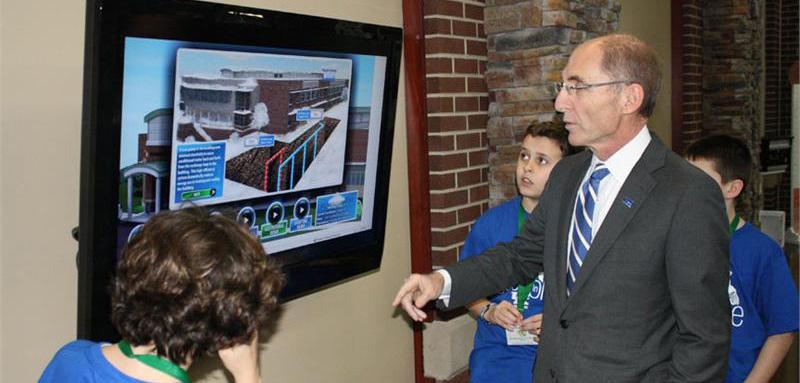
Our school designs focus on two things.


Our school designs focus on two things.





while dramatically reducing or eliminating energy costs


Sherman Carter Barnhart Architects believes, "Exceptional Design Changes Lives." We change lives by designing schools focused on learning spaces for generation next, that engage and inspire learning while dramatically reducing or eliminating energy costs.
Recognized as leaders in the planning and design of schools, Sherman Carter Barnhart’s team of educational specialist offer an unparalleled level of knowledge in Next Generation Learning, Resilient Design, and ZeroEnergy design. Our dedicated team provides innovative design solutions that enhance safety, sustainability, and functional efficiency of each school, while catering to the unique needs of every student. We understand that each school is different, and our approach to every project begins with listening to our clients’ goals and values to shape their vision.
As your partner, we assist with facilities assessments, pre-design services, site analysis services, educational programming and design services, pre-bond planning, and coordination & communications/public relations. We develop high-quality drawings for accurate cost estimates and better bids, assisting with bidding and negotiations, and leading contract administration and field observations.

Our team of educational professionals are dedicated to the planning, programming, and design of schools. Our portfolio includes over 700 schools, including:
+ 15 New Career & College Readiness Centers & 22 Renovations
+ 11 New Central Offices & 10 Renovations
+ 74 New Elementary Schools & 239 Renovations
+ 23 New Middle Schools & 109 Renovations
+ 21 New High Schools & 261 Renovations
+ 2 - Zero Energy Schools
+ 23 - Zero Energy Ready and/or Emerging Schools
Our design process involves collaboration with clients to translate their goals and values into a distinctive, customized solution that meets the needs of their district. We design schools that enrich how students learn, set standards in energy efficiency, and encourage community use and engagement.
Sherman Carter Barnhart Architects is committed to improving lives and leaving a positive impact on the communities we serve through our designs.
Our schools are designed to improve peoples’ lives in the community they serve.






COMMUNITY CONNECTED
Sherman Carter Barnhart Architects is dedicated to designing schools that are truly student and teacher-centered, and we believe that our design philosophy is the key to creating schools that will enrich the lives of all those who use them.
CREATIVE & INNOVATIVE SUPPORTS EVERY LEARNER
ENERGY EFFICIENT & SUSTAINABLE COST EFFECTIVE TO BUILD & OPERATE SAFE & SECURE
Our "Student and Teacher Centered" design philosophy is based on the following principles:
+ Being Environmentally Friendly and Energy Efficient
+ Being Community Connected
+ Being Cost-Efficient to Build, Operate, and Maintain
+ Encouraging Creativity and Innovation
+ Supporting Every Learner
+ Creating a Safe and Secure Environment + Disaster Resilient
We use these principles as a guide to keep the design process focused on creating a school that will meet the unique needs of your students, teachers, district, parents, and community. By designing schools that are centered around the needs of students and teachers, we design learning spaces for generation next while while dramatically reducing or eliminating energy costs. while
dramatically reducing or eliminating energy costs






• Energy is a school districts second highest expenditure.
• A Zero-Energy designed school costs the same as a conventionally built school.
• A Zero- Energy Achievable school can lower a school district’s operating costs by up to 75%.
• Energy is an expense schools can reduce without sacrificing educational quality.
1. Richardsville Elementary, Warren County Schools
2. Jennings Creek Elementary, Warren County Schools
(infrastructure is in place and the energy use is at 25 EUI or less so if solar is added it could reach emerging or full zero energy.)
1. Burnside Elementary, Pulaski County Schools
2. Rich Pond Elementary, Warren County Schools
3. Cecilia Valley Elementary, Hardin County Schools
4. Hardin County Early College & Career Center, Hardin County Schools
5. Taylorsville Elementary, Spencer County Schools
6. Flaherty Primary, Meade county Schools
7. Lone Oak Middle School, McCracken County Schools
8. Ezra Sparrow Elementary School, Spencer County Schools
9. McCracken County High School, McCracken County Schools
10.



(some form of solar just not enough to power the entire buildings)
1. Bardstown Elementary, Bardstown City Schools
2. Meade County Career & College Center, Meade County Schools
3. Bristow Elementary, Warren County Schools
4. Jody Richards Elementary, Warren County Schools
5. Cumberland Trace Elementary, Warren County Schools
6. Irvington Elementary, Breckinridge County Schools
7. Hardinsburg Elementary, Breckinridge County Schools
8. South Warren Middle & High School, Warren County Schools
9. Impact Center for Leadership & Innovation, Warren County Schools
10. Kyrock Elementary, Edmonson County Schools
13.
*

Richardsville Elementary School is a remarkable achievement in sustainable design and innovation. Situated on a picturesque hillside overlooking a community park and wooded ravine, the school was built on the same site as the old Richardsville Elementary. The design team salvaged materials from the old school, including fieldstone veneer and parquet wood flooring, and incorporated them into the new facility.
Warren County Public Schools challenged the design team to create a zero-energy school that would incorporate water efficiency, a sustainable site, material and resource conservation, and an indoor/outdoor environment to promote healthy, progressive learning.
A 248 kW photovoltaic array consisting of roof-mounted thin film panels and a shade structure of mono-crystalline panels provides 100% of the building’s energy needs annually. Although providing enough solar energy to power the building was relatively easy, the design team faced significant challenges in achieving their goal of reducing energy usage by 75% and ensuring that
FIRST ZERO ENERGY VERIFIED PUBLIC SCHOOL IN THE NATION !

the total construction costs, including the solar array, did not exceed the standard Kentucky Department of Education’s (KDE)budget for a new elementary school.
One of the design’s essential features was the integration of energy-saving and sustainable features into the curriculum, creating a learning environment that encourages curiosity and imagination outside the classroom. Themed hallways immerse students in the knowledge of the building’s systems and performance, including a geothermal hallway that displays temperature gauges, a solar hallway that shows the amount of energy transferred from the sun to laptop batteries, a water conservation hallway that demonstrates rainwater collection and filtration, and a recycling hallway with bins that enable students to measure recycling quantities.
The school’s technology features building wide internet access with students equipped with laptops and iPads to provide access to knowledge beyond the classroom. An outdoor classroom with a weather station allows students to monitor the impact of weather and the environment on the building’s performance, further reinforcing the importance of sustainable practices.
Richardsville Elementary serves as a model for sustainable school design and energy-efficient building practices.







ZERO-ENERGY
DISASTER RESILIENT
ICF CONSTRUCTION
VERIFIED ENERGY USAGE | SAVINGS
18.2 EUI | $204,000 year
SERVICES
Architecture • Interiors •
Structural Engineering • Landscape
Architecture • Civil Engineering
SIZE
72,285 SF • 500 Students
SUSTAINABLE FEATURES
- 248 kw Photovoltaic Alternative
Renewable Energy Source
- Insulated Concrete Form (ICF) Bldg
Envelope
- Passive Daylighting Controls/ Strategies
- Geothermal HVAC
- Efficient Kitchen StrategiesEliminates Type 1 Hood
- Super Insulated R-32 Roof
- Occupancy, Motion & CO2
Monitoring
- LED Lighting
- Net Metering
- Stained Polished Concrete Floors
- Operations/Maintenance Plan
CONSTRUCTION COST
$15,200,000 w/solar
STATUS
Complete
REFERENCE
Mr. Chris McIntyre, CFO 270-781-5150
chris.mcintyre@warren.kyschools.us

Jennings Creek Elementary School exemplifies the energy-reducing design strategies adopted across the district, utilizing solar power as an on-site renewable energy source to achieve a zero-energy status. The school is situated on a shared campus with the neighboring Henry Moss Middle School, fostering integrated learning between the two institutions and establishing a cohesive P-8 learning environment.
Though the buildings are physically separate, an outdoor walkway and supervised corridor connect them, enabling staff and students to access the multifunctional Cafetorium featuring a stage, Group Study Areas, and the eye-catching Monumental Collaboration Stair. During evening events, the classroom wings can be secured while still permitting access to the Collaboration Areas.
ONE OF THE TWO MOST ENERGY EFFICIENT SCHOOLS IN THE NATION !

The Media Center houses maker spaces designed to encourage group meetings and nurture collaborative thinking among students. At the heart of the Media Center is the Media Hub, where students can use computer workstations in a supervised setting.
Every classroom is equipped with flexible seating options, including wobble chairs, exercise balls, and couches, allowing students to expend energy in nondisruptive ways while enhancing the learning experience. The easily movable furniture further supports this approach.
The school’s green kitchen strategies involve eliminating deep fryers and tilting skillets to conserve energy and align with the district’s commitment to offering healthier meals to students.






ZERO-ENERGY
DISASTER RESILIENT
ICF CONSTRUCTION
VERIFIED ENERGY USAGE | SAVINGS
15.5 EUI | $195,000 year
SERVICES
Architecture • Interiors • Structural
Engineering
SIZE
88,469 SF • 750 Students
SUSTAINABLE FEATURES
- 327 kw Photovoltaic Alternative
Renewable Energy Source
- Net Metering
- Insulated Concrete Form (ICF) Bldg
Envelope
- Passive Daylighting Controls/ Strategies
- Geothermal HVAC
- Type 1 Hood Eliminated
- Super Insulated R-32 Roof
- Occupancy, Motion & CO2
Monitoring
- LED Lighting
- Stained Polished Concrete Floors
CONSTRUCTION COST
$17,944,782 w/solar
STATUS
Complete
REFERENCE
Mr. Chris McIntyre, CFO 270-781-5150
chris.mcintyre@warren.kyschools.us

Kentucky’s first zero-energy emerging, disaster-resilient public school, Bardstown Elementary’s innovative layout revolves around pods, creating an optimal learning environment where classrooms surround a dynamic and flexible learning resource area. Primary grades are located on the first floor, while the second floor accommodates the intermediate grades.
At the heart of the school lies the centrally located student commons, a hub of technology and adaptability. This vibrant space boasts a social stair, an exhilarating recreational slide, and a captivating movie screen, sparking excitement and creativity among students. Beyond serving as the cafeteria, the commons area doubles as a staging point for students arriving and departing, fostering a smooth and efficient daily flow. With its remarkable flexibility and technology integration, the student commons transforms into an inspiring setting for a multitude of educational opportunities throughout the day.
KENTUCKY’S FIRST ZERO EMERGING & DISASTER RESILIENT SCHOOL

Connected to the commons, the gymnasium takes center stage, featuring a spacious layout with 850 seats. The gym is also a designated community tornado shelter, equipped to withstand forces of nature with resilience against tornadic winds reaching up to 250 mph. Its self-sustaining systems, including ventilation, plumbing, and electricity, ensure operational continuity during and after any weather event, prioritizing the safety and well-being of all within.
The second floor media center overlooks the bustling commons area. This thoughtfully designed space incorporates multiple zones of flexible seating and furnishings, catering to diverse educational settings, encouraging collaboration and exploration. A recreational slide whisks students down to the central space, infusing fun and excitement into the daily routine. The media center also houses a wireless computer lab, a story-telling area, and a dynamic makers space, empowering students to embrace the wonders of technology and creativity.
The exterior design beautifully embraces the historical charm of the surrounding community, paying homage to the traditional architectural details found in the historical Bardstown area. Its compact size and volume, combined with the innovative construction using Insulated Concrete Forms (ICF), guarantee maximum energy efficiency and sustainability, showcasing the school’s commitment to environmental responsibility.
A 30kw solar array effectively offsets a portion of the energy consumption during a typical school day.






ZERO-ENERGY EMERGING
INTEGRATED STORM SHELTER
DISASTER RESILIENT
ICF CONSTRUCTION
VERIFIED ENERGY USAGE | SAVINGS
17.5 EUI | $175,000 year
SERVICES
Architecture • Interiors • Structural Engineering
SIZE
89,911 SF • 850 Students
SUSTAINABLE FEATURES
- 30kw Solar Array Renewable Energy Source
- ICF Exterior Walls - A Disaster Resilient Structure
- Solatubes/Daylight Harvesting
- Geothermal HVAC
- Type 1 Hood Eliminated
- Super Insulated R-32 Roof
- Occupancy, Motion & CO2 Monitoring
- LED Lighting
CONSTRUCTION COST
$19,265,000
STATUS
Complete
REFERENCE
Dr. Ryan Clark, Superintendent
502-331-8800
ryan.clark@bardstown.kyschools.us
BARDSTOWN

INTEGRATED

SECOND

INTEGRATED STORM SHELTER

The Impact Center for Leadership & Innovation is designed to be a cutting-edge teaching and learning center for middle and high school-aged students, as well as a community and school district resource. Committed to providing students with the resources and support they need to achieve academic success with career pathways and college preparedness, the Center offers a robust traditional curriculum coupled with an advanced college and career center featuring dynamic and industry-led pathways supported by flexible labs and makerspaces.
An unique feature is the Teaching Laboratory, which serves as a professional development hub for Warren County educators. Here, instructors have access to the latest teaching techniques, technologies, and research, allowing them to continually improve their skills and deliver highquality instruction to students.
Committed to expanding opportunities for all students, including those who may be traditionally underrepresented in the STEM fields, the Center is dedicated to helping
THE FIRST “LEADER IN ME” DESIGNED SCHOOL IN THE WORLD !

students prepare for college and career readiness. With a range of programs and activities to be offered including a variety of career paths, internships, and mentoring opportunities, every student will have access to high-quality education and resources.
Recognizing the national teacher shortage, the school is designed to support the need for a limited number of instructors, allowing for personalized attention and individualized instruction. Makerspaces and flexible labs for classrooms enable students to explore their interests and passions through hands-on projects and experiential learning.
A Information Technology suite features numerous stations and technology resources, focused on preparing today’s and tomorrow’s students. Recognizing the critical importance of technology-enriched spaces and opportunities, WCPS has invested in the latest technologies and tools, to equip their students with the skills and knowledge they need to thrive in a rapidly evolving digital landscape.
Sleek metal panels make up the majority of the building’s façade, creating a contemporary and modern visually striking appearance. The panels were chosen for their durability, energy efficiency, and low-maintenance qualities. Large windows and glass walls allow natural light to flood the interior spaces, providing a bright and inviting learning environment, creating a positive effect on student learning and wellbeing.
The use of metal panels, daylighting, geothermal HVAC, ICF construction, and a 50kw solar source, coupled with a compact-in-size floor plan continues the district-wide energy-reducing design strategies to achieve zero energy emerging status.






ZERO-ENERGY EMERGING
DISASTER RESILIENT
INTEGRATED STORM SHELTER
ICF CONSTRUCTION
SERVICES
Architecture • Interiors • Structural Engineering
SIZE
177,719 SF • 1,000 Students
200 Student Career & Tech Center
2,000 Student Future Expansion
SUSTAINABLE FEATURES
- 50 kw Photovoltaic Renewable
Energy Source
- Net Metering
- Insulated Concrete Form (ICF) Bldg Envelope
- Passive Daylighting
- Geothermal
- Type 1 Hood Eliminated
- Super Insulated R-32 Roof
- Occupancy, Motion & CO2 Monitoring
- LED Lighting
CONSTRUCTION COST est. $70,000,000
STATUS
To Be Complete 2025
REFERENCE
Mr. Chris McIntyre, CFO 270-781-5150
chris.mcintyre@warren.kyschools.us
SCB Principal’s Kenny Stanfield & Justin McElfresh, frequently speak at National Ready Mix Concrete Association (NRMCA) events on the design of disaster resilient schools utilizing ICF construction.

HIGH PERFORMANCE ENVELOPE
ONE BUILDING SYSTEM THAT INCORPORATES
• LOAD BEARING WALLS
• INSULATION
• THERMAL MASS
• AIR BARRIER
• SOUND ISOLATION
• STORM RESISTANCE
• SPEED OF CONSTRUCTION






Sherman Carter Barnhart was the first firm to utilize Insulated Concrete Form (ICF) construction in Kentucky.
FIRST
SCHOOL In 2006, Alvaton Elementary, Warren County Schools was the FIRST ICF public school.

Sherman Carter Barnhart designed South Warren Middle & High School, Warren County Schools - 332,000 SF
South Warren Middle & High School is the first educational building with both interior and exterior ICF bearing walls.
Sherman Carter Barnhart designed the Nation’s first Zero Energy School utilizing ICF construction.
ALVATONELEMENTARY





while dramatically reducing or eliminating energy costs


Kenny Stanfield, AIA, LEED AP Principal
Sherman Carter Barnhart Architects
859.224.1351
kstanfield@scbarchitects.com
Justin McElfresh, AIA, LEED AP Principal
Sherman Carter Barnhart Architects
85.224.1351
jmcelfresh@scbarchitects.com
